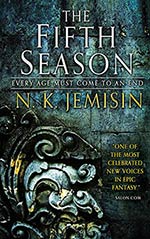
![]() nightxade
nightxade
3/19/2016
![]()
There is so much to say about Jemisin's work, which I have avidly added to my bookshelf since falling in love with The Hundred Thousand Kingdoms. That's not to say I have enjoyed every aspect of her storytelling--The Dreamblood Duology let me down in some ways--but I do love that the stories she tells are so unique. In a genre filled with the same old same old, it's such a delight to read worlds that are so different from our own--and yet not so different after all.
In The Fifth Season, Jemisin introduces us to the Stillness, where every few years or decades or centuries, a great seismic event ushers in a new Season, destroying life before it. But not all life. While the events are apocalyptic in scale, humanity still finds a way to survive and rebuild and prepare for the next occurrence. There is stonelore that speaks of these events, but as with all history, there are pieces missing--whether through genuine loss, or deliberate removal or alteration--and at the heart of everything are the orogenes--people born with the biological ability to "sess" the power of the Earth and shape it to their will. Such power is dangerous for obvious reasons, but it can also be used to the benefit of those around them. Orogenes ought to be revered for their abilities, if not at least respected, but of course, they are not.
The story is told through the eyes of three orogones: Damaya, a young girl taken by a Guardian to learn the ways of the Fulcrum in order to become an instrument--a weapon--of those in command, Essun, a mother whose abilities are revealed when her child is murdered by his father for being an orogene, and Syenite, a four-ring Fulcrum adept tasked with a mission she could care less for save that it is a way for her to advance in her ranks.
Essun's chapters are the most compelling to me because they are told through second person--a very unique perspective that I can't recall coming across before. Jemisin plunges you into her mind, forcing you to empathize with a woman who must pick up the pieces of her life in the aftermath of her son's brutal death. Perhaps it was easy for me to identify with her, being a mother myself, but perhaps it does not take much to understand the pain such a loss would cause. I have reason to suspect the entire book was intended to be told in this perspective, but I'm glad that was changed.
None of the characters in this book are likable. That is not to say they are not written well. Rather, for various reasons you discover as you go along, they are not the kind of people that you'd actively seek to befriend--and they have no interest in befriending you, which, once again, is unusual in writing. Usually readers are presented with a protagonist that you want to love and respect and cheer for, but can that be said of the irascible Syenite? This is a far cry from my reading experience with Jemisin's Inheritance Trilogy where I continue to want to cuddle all of these characters for days (and even named my cat after Nahadoth). But this is by no means a criticism of this book. Syenite, Damaya, and Essun may not have endeared themselves to me, but that did not make their journeys any less compelling as Jemisin weaves the plot around them and reveals little by little (or a lot in a particular chapter where that last tidbits of info pour out all at once in what felt like a bit of a rush).
The Hundred Thousand Kingdoms remains my favourite of Jemisin's work because it hit me so hard emotionally and has stayed with me since, but The Fifth Season is no less powerful, albeit in a different way. Like a slow rumbling beneath the surface that threatens to swallow me whole...